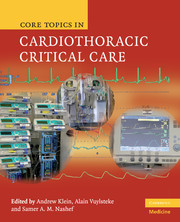Book contents
- Frontmatter
- Contents
- Contributors
- Preface
- Foreword
- Abbreviations
- SECTION 1 Admission to Critical Care
- 1 Who needs cardiothoracic critical care?
- 2 Scoring systems and prognosis
- 3 Admission to critical care: The cardiology patient
- 4 Admission to critical care: Heart failure
- 5 Admission to critical care: The respiratory patient
- 6 Resuscitation after cardiac surgery
- 7 Transport of the cardiac critical care patient
- SECTION 2 General Considerations in Cardiothoracic Critical Care
- SECTION 3 System Management in Cardiothoracic Critical Care
- SECTION 4 Procedure-Specific Care in Cardiothoracic Critical Care
- SECTION 5 Discharge and Follow-up From Cardiothoracic Critical Care
- SECTION 6 Structure and Organisation in Cardiothoracic Critical Care
- SECTION 7 Ethics, Legal Issues and Research in Cardiothoracic Critical Care
- Appendix Works Cited
- Index
4 - Admission to critical care: Heart failure
from SECTION 1 - Admission to Critical Care
Published online by Cambridge University Press: 05 July 2014
- Frontmatter
- Contents
- Contributors
- Preface
- Foreword
- Abbreviations
- SECTION 1 Admission to Critical Care
- 1 Who needs cardiothoracic critical care?
- 2 Scoring systems and prognosis
- 3 Admission to critical care: The cardiology patient
- 4 Admission to critical care: Heart failure
- 5 Admission to critical care: The respiratory patient
- 6 Resuscitation after cardiac surgery
- 7 Transport of the cardiac critical care patient
- SECTION 2 General Considerations in Cardiothoracic Critical Care
- SECTION 3 System Management in Cardiothoracic Critical Care
- SECTION 4 Procedure-Specific Care in Cardiothoracic Critical Care
- SECTION 5 Discharge and Follow-up From Cardiothoracic Critical Care
- SECTION 6 Structure and Organisation in Cardiothoracic Critical Care
- SECTION 7 Ethics, Legal Issues and Research in Cardiothoracic Critical Care
- Appendix Works Cited
- Index
Summary
Introduction
The combination of the aging of the population and improved survival after myocardial infarction (MI) has increased the prevalence of chronic heart failure. Most patients are admitted to hospital with advanced heart failure as a result of acute decompensation of their disease, but some patients with new onset heart failure present in extremis. In addition, patients with impaired ventricular function who undergo surgery may present with low output states. Coronary artery disease is the cause of heart failure in 60–70% of patients, but in younger patients (such as the population referred for cardiac transplantation), dilated cardiomyopathy (often of unknown etiology) is the commonest cause. The true incidence of acute myocarditis in patients with a short history of heart failure is not known because of the difficulty in confirming the diagnosis. Forty-five percent of patients hospitalized with heart failure will be readmitted at least once (and 15% at least twice) within 1 year.
Prognosis
Patients with advanced heart failure have a very poor prognosis. For example, in patients admitted with acute pulmonary oedema, in-hospital mortality has been reported to be 12% and the 1-year mortality, 40%.
- Type
- Chapter
- Information
- Core Topics in Cardiothoracic Critical Care , pp. 20 - 28Publisher: Cambridge University PressPrint publication year: 2008



